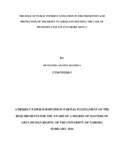| dc.contributor.author | Munyithya, Justus M | |
| dc.date.accessioned | 2016-11-18T08:49:52Z | |
| dc.date.available | 2016-11-18T08:49:52Z | |
| dc.date.issued | 2016 | |
| dc.identifier.uri | http://hdl.handle.net/11295/97557 | |
| dc.description.abstract | Kenya‟s journey from a period when the enforcement of social and economic rights was considered as a favor from the government has been a long one. It began by Wangari Maathai (the Nobel Laureate) testing this by filing a suit in the High Court in an attempt to protect public land on which construction of a private property was to be made. Although the suit failed for lacking locus standi, it formed a basis upon which public interest litigation (PIL) would thrive in future. Upon the promulgation of the Constitution of Kenya in 2010 one of its key pillars was the expansion of locus standi and the removal of previous challenges that inhibited access to justice for the poor and marginalized members of society.
The study presents PIL as one of mechanism through which social justice for the poor and marginalized in urban centers can be attained in protecting their right to housing. Using Muthurwa estate in Nairobi, Kenya as a case study, it reviews the challenges the people of this estate underwent in realizing there rights to adequate housing. Without financial resources, they relied on civil society groups to institute a suit that would restore their right to housing. Notwithstanding that the right to adequate housing is a constitutional right in the Bill of Rights (Article 43), it is evident that oftenly the letter of the law is different from the actual practice.
In restoring the right to adequate housing for the residents, the court had to use provisions of international law and best practices from the USA, South Africa and India where courts had successfully given orders in support of the promotion and protection of socio-economic rights. However the legal challenges still persist, Kenya has not established an eviction law to regulate the conduct of evictions thus impunity in eviction in the face of court orders is still common. Poverty is still a factor that makes it difficult for people to institute proceedings that would protect their socio-economic rights. The study recommends that for PIL to be more successful in alleviating socio-economic rights and the right to housing in particular, it would have to be complemented by other measures such as community mobilization in addition to advocacy groups. | en_US |
| dc.language.iso | en | en_US |
| dc.publisher | University Of Nairobi | en_US |
| dc.rights | Attribution-NonCommercial-NoDerivs 3.0 United States | * |
| dc.rights.uri | http://creativecommons.org/licenses/by-nc-nd/3.0/us/ | * |
| dc.subject | Promotion And Protection Of The Right To Adequate Housing | en_US |
| dc.title | The Role Of Public Interest Litigation In The Promotion And Protection Of The Right To Adequate Housing: The Case Of Muthurwa Estate In Nairobi, Kenya | en_US |
| dc.type | Thesis | en_US |



